I get a lot of music for my consideration, already more than 220 new releases so far this year. Almost all of them are notable for something, and I’d like to give them their due. So, when I’m not previewing live events in Northeast Ohio, I’ll offer hot takes on recent releases. Like these.
The title cut from Yuval Amihai‘s My 90s Summer (Fresh Sound Records) begins with the leader’s warm-toned guitar over dewdrop Rhodes and a head-nodding backbeat rhythm. Where have I heard this before?
title cut from Yuval Amihai‘s My 90s Summer (Fresh Sound Records) begins with the leader’s warm-toned guitar over dewdrop Rhodes and a head-nodding backbeat rhythm. Where have I heard this before?
Of course. It’s “Breezin’,” George Benson’s mega-crossover hit of my 70s summer. True, Amihai doesn’t have Benson’s deep bop chops and drummer Jeremy Dutton plays with a crackling edginess that’s worlds away from Harvey Mason’s velvet understatement on the earlier hit, but the comparison isn’t entirely inapt. Alas, crossover hits like Benson’s seem as likely to return as leisure suits and tequila sunrises. Still, if jazz is to get a foothold in the wider culture, players unafraid of pretty melodies might well lead the charge. Amihai is one of them. His warmheartedness, a quality shared by fellow Israeli-born guitarist, Roni Ben-Hur, is another plus, as his good taste in sidemen, especially old-pro David Kikoski who nearly steals the show on his solo turns. Amihai’s debut U.S. release will make a nice accompaniment to your 2020s summer.
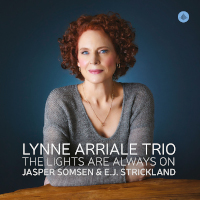
With compositions dedicated to the late Rep. John Lewis, Ruth Bader Ginsburg and Alexander Vindman, Lynn Arriale‘s The Lights Are Always On (Challenge Records) won’t be on heavy rotation on heard under the credit roll of the Tucker Carlson show. Here’s a piano trio session that, like the cover photo of the leader, isn’t afraid to look you straight in the eye and make a statement of belief straight from the heart. Laced with big, gospel flexes and broad, noble chord progressions, Arriale’s music is as forthright as her sentiments. On the opening “March On,” every keystroke sounds deliberate and committed, informed by an resolute sense of purpose. She’s aided by her longtime bassist, Jasper Somsen, who aims for the homespun eloquence of Charlie Haden, and by sharp-eared drummer E. J. Strickland, who could be a little more prominent in the mix. A word about the title cut, a midtempo, straight-eight composition with a pretty melody and rippling, Pat Methenian accompaniment. It’s based on a quote by a Tacoma, Washington surgeon praising the dedication and quiet heroism of his colleagues in the darkest days of the pandemic. Fittingly, Arriale resists harmonic resolution at the song’s end. The lights are always on, she seems to say, because the work never ends.
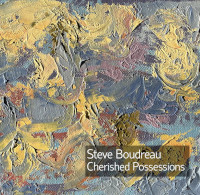 Musicians from Toronto and Vancouver are beginning to get some traction south of the 49th parallel and the Montréal scene is a treasure waiting to be discovered, but don’t sleep on Ottawa. The nation’s capital is home not only to a great jazz festival, but also to a homegrown scene of interesting players. Steve Boudreau is one of them, a New England Conservatory-trained pianist with a piquant compositional voice showcased on Cherished Possessions (self released). Eight of the ten compositions here are originals that move in interesting directions reminiscent of Carla Bley and Steve Swallow. At NEC, Boudreau studied with Fred Hersch, and you can hear the elder pianist’s influence in the harmonic richness and quicksilver movement from light to dark of his ballads. Boudreau’s Montréal-based rhythm team of bassist Adrian Vedady and drummer Jim Doxas are ever ready to underline a juicy harmony or jolt the music with an unexpected fill. Cherished Possessions is nicely recorded, too, but maybe could have used a bit more rehearsal time (the session was captured in a single afternoon last October). Here’s hoping that the pianist’s music and and this excellent trio get the glossy production they deserve and soon.
Musicians from Toronto and Vancouver are beginning to get some traction south of the 49th parallel and the Montréal scene is a treasure waiting to be discovered, but don’t sleep on Ottawa. The nation’s capital is home not only to a great jazz festival, but also to a homegrown scene of interesting players. Steve Boudreau is one of them, a New England Conservatory-trained pianist with a piquant compositional voice showcased on Cherished Possessions (self released). Eight of the ten compositions here are originals that move in interesting directions reminiscent of Carla Bley and Steve Swallow. At NEC, Boudreau studied with Fred Hersch, and you can hear the elder pianist’s influence in the harmonic richness and quicksilver movement from light to dark of his ballads. Boudreau’s Montréal-based rhythm team of bassist Adrian Vedady and drummer Jim Doxas are ever ready to underline a juicy harmony or jolt the music with an unexpected fill. Cherished Possessions is nicely recorded, too, but maybe could have used a bit more rehearsal time (the session was captured in a single afternoon last October). Here’s hoping that the pianist’s music and and this excellent trio get the glossy production they deserve and soon.
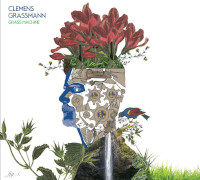
As pandemic restrictions began to be lifted and musicians returned to stages and studios, all their pent-up frustrations, ideas and energy were unleashed. You can hear this happen on “Re.Op.,” the opening cut of Grass Machine by the Berlin-born New York drummer Clemens Grassman. After establishing a unison melody over a flowing, additive-meter pulse, the three saxophonists, David Milazzo on alto, Sam Dillon and Chris Bittner on tenor, launch a series of brawling, sometimes overlapping solo statements like three pre-adolescent brothers who’ve been confined to a single bedroom on a rainy afternoon. This tangle of pushy horns, including fiery trumpeter Aaron Bahr and repeated often on this 37-minute program, is reminiscent of the free-for-alls unleashed by Elvin Jones on the Blue Note recordings he made with Frank Foster, Steve Grossman, Dave Liebman and Joe Farrell. Grassman attacks the drums with the intensity of Buddy Rich after three Red Bulls. Drop the needle and get out of the way.
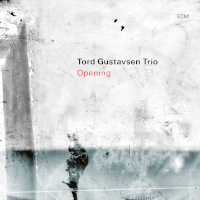
At the opposite end of the subtlety scale is Opening by the Norwegian pianist Tord Gustavsen (ECM Records). Opening is the ninth in a series of recordings for ECM begun by Gustavsen in 2003 and released every other year with the exception of 2009 and the pandemic year of 2020. The music is as orderly and considered as ECM’s release schedule, drawing from Nordic folk song, Keith Jarrett’s early work, Protestant hymnody and Black gospel sources. Which is to say that Gustavsen offers little that’s new here, except for some subtle electronics and the debut of Steinar Raknes replacing Harald Johnsen on bass. It’s tempting to dismiss this music as hygge jazz, a curated, lifestyle accessory lifted from a Pinterest mood board. Yet the comfort in Gustavsen’s warm, chorale-like chords, in the way the bass reassuringly tolls the one and the whispery rustle of Jarle Vespestad’s brushed cymbals all feels real. and really appropriate to our comfort-seeking times. Producer Manfred Eicher, must have agreed. He lavished his most careful production on Opening, choosing the Lugano hall that seems to have become his preferred recording venue.
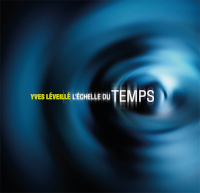
On his website, Yves Léveillé identifies himself as “pianiste et compositeur,” but on L’échelle du temps (Effendi Records) it’s the latter role that takes precedence. That might come as no surprise given the Montréaler’s chosen instrumentation: piano plus string quartet with double bass. The pianist is an almost obbligato presence on many of the eight compositions, yielding center stage to the strings on music that seems to be almost entirely through-composed. Léveillé’s themes are attractive and evocative. Close your eyes and you can almost imagine the characters in a Nouvelle Vaque film that his melodies might represent. Yet when Léveillé engages with the jazz tradition, it’s at arm’s length, as on the Debussian faux-ragtime of “Encodage 2.0.” Léveillé’s jazz bona fides seem strong; his website lists nine records as a leader with players such as pianist Eri Yamamoto and bassist Vedady. Though I’ve not heard them, they might be the place to start for listeners who want to hear Léveillé le pianiste de jazz to best advantage.
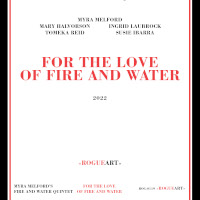 If ever a record could be recommended on its personnel alone, Myra Melford‘s For the Love of Fire and Water (RogueArt) is it. Get a load of the pianist’s Fire and Water Quintet: guitarist Mary Halvorson, percussionist Susie Ibarra, Ingrid Laubrock on soprano and tenor saxophone and cellist Tomeka Reid. That’s a lineup that can stand with any of the all-too-numerous all-star (and invariably all-male) recording bands throughout history. Except unlike almost all of them, this formation completely delivers on its promise, and then some. Among the many marvels of Melford’s ten-part suite is the way that the star power of the individual players is fully placed in the service of an ensemble sound and approach. Of course, there are meteor showers of individual brilliance and they’re everywhere. That’s to be expected, but I have to single out Ibarra, who hasn’t been heard from nearly often enough recently. Her range of colors, especially on metallophones, and the painterly way she deploys them is astounding. Like the painter Cy Twombly whose “Gaeta Set (for the Love of Fire & Water)” was an inspiration for her composition, Melford responds deeply to the natural world. Nature’s beauty and terror, its order and chaos, its humming, thrumming aliveness are all in this music of vaulting ambition. The final movement, a grave, Bach-ian chorale, is devastating. It’s way to early to crown a record of the year, but if a more deeply inspired and movingly played recording awaits release in 2022 I can’t wait to hear it.
If ever a record could be recommended on its personnel alone, Myra Melford‘s For the Love of Fire and Water (RogueArt) is it. Get a load of the pianist’s Fire and Water Quintet: guitarist Mary Halvorson, percussionist Susie Ibarra, Ingrid Laubrock on soprano and tenor saxophone and cellist Tomeka Reid. That’s a lineup that can stand with any of the all-too-numerous all-star (and invariably all-male) recording bands throughout history. Except unlike almost all of them, this formation completely delivers on its promise, and then some. Among the many marvels of Melford’s ten-part suite is the way that the star power of the individual players is fully placed in the service of an ensemble sound and approach. Of course, there are meteor showers of individual brilliance and they’re everywhere. That’s to be expected, but I have to single out Ibarra, who hasn’t been heard from nearly often enough recently. Her range of colors, especially on metallophones, and the painterly way she deploys them is astounding. Like the painter Cy Twombly whose “Gaeta Set (for the Love of Fire & Water)” was an inspiration for her composition, Melford responds deeply to the natural world. Nature’s beauty and terror, its order and chaos, its humming, thrumming aliveness are all in this music of vaulting ambition. The final movement, a grave, Bach-ian chorale, is devastating. It’s way to early to crown a record of the year, but if a more deeply inspired and movingly played recording awaits release in 2022 I can’t wait to hear it.
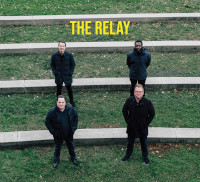 The Relay (Same Island Music) is the debut recording by the more-or-less cooperative quartet comprising tenor saxophonist Dan Pratt, pianist Michael Eckroth, bassist Matt Clohesy and increasingly busy drummer Allan Mednard (I say “more-or-less” because the publicity materials highlight the first two players). Pratt and Clohesy have extensive experience with the big bands of Christian McBride and Darcy James Argue respectively, so it makes sense that the nine cuts all have a solid compositional architecture. Five of the originals were written by Eckroth with the remaining three by Pratt, and all feature strong melodies. Even the one non-original, the standard ballad “Polka Dots and Moonbeams,” has an arrangement, though it was apparently called in the studio. Pratt caresses the melody with a Dexter-ous bedroom tenor solo, but elsewhere, as on the swaggering modal, 3/4 “Spirit Walk,” he flexes a meaty tone. An already accomplished band to watch.
The Relay (Same Island Music) is the debut recording by the more-or-less cooperative quartet comprising tenor saxophonist Dan Pratt, pianist Michael Eckroth, bassist Matt Clohesy and increasingly busy drummer Allan Mednard (I say “more-or-less” because the publicity materials highlight the first two players). Pratt and Clohesy have extensive experience with the big bands of Christian McBride and Darcy James Argue respectively, so it makes sense that the nine cuts all have a solid compositional architecture. Five of the originals were written by Eckroth with the remaining three by Pratt, and all feature strong melodies. Even the one non-original, the standard ballad “Polka Dots and Moonbeams,” has an arrangement, though it was apparently called in the studio. Pratt caresses the melody with a Dexter-ous bedroom tenor solo, but elsewhere, as on the swaggering modal, 3/4 “Spirit Walk,” he flexes a meaty tone. An already accomplished band to watch.
